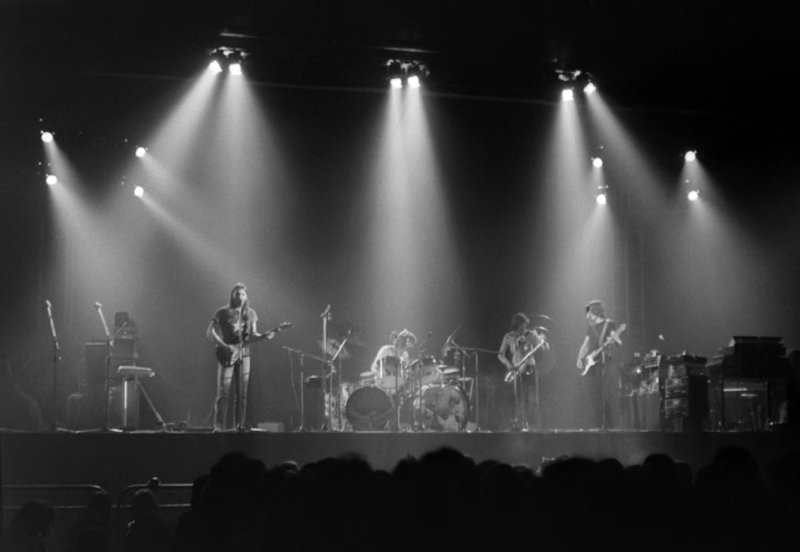Explore Pink Floyd Through This Former Beijinger's New Book
Here at the Beijinger we are always happy to hear about the successes of our former staff members, and one such story is that of former Beijinger editor Mike Cormack, who has written a deep-dive book about Pink Floyd, one of the most iconic rock bands of all time.
Now living in Changchun where his is a high school principal, Cormack’s debut book, Everything Under the Sun: The Complete Guide to Pink Floyd, is being released today! The book offers a song-by-song analysis, a full chronology of the band’s history, exclusive interviews with surviving members, and much more. Cormack brings a unique perspective to the band's music, examining their immense cultural impact while weaving in a broader cultural history of the UK. With Everything Under the Sun, Cormack aims to provide the definitive guide for Pink Floyd enthusiasts.

To find out more, we talked to Cormack to discuss the book, his insights, the enduring legacy of Pink Floyd, and what makes their music resonate across generations.
Firstly, what initially drew you to write about Pink Floyd? Have you always been a big fan?
As I say in the book, I’m a second-generation fan – my dad and my uncles were always playing their albums, and I absorbed a lot of their musical influences. My dad in particular had a huge and extremely varied musical taste – he was essentially a prog rocker, but liked everything from dub poets to Celtic folk to electro to heavy metal to krautrock, and he made it his business to convert people to what he liked – he had this sort of missionary attitude to music, which clearly meant a great deal to him. Pink Floyd was far and away his favorite band. So, all of this came to me before I was even in my teens.
In your opinion, what sets Pink Floyd apart from other rock bands of their time, and why do you think they’ve had such a lasting impact?
More than any band I know, Pink Floyd captures the existential drama of being alive. They convey feelings and tackle themes once reserved for religion – alienation, isolation, despair, the yearning for spirituality and for human connection, loss and grief. The song “Shine On You Crazy Diamond” is both a prayer and an elegy, while “Eclipse” (which brings Dark Side of The Moon to an epic ending) is a litany, so there’s a religious sense that pervades some of their best work. Or there are songs like “Comfortably Numb,” “Mother,” and “Paranoid Eyes,” which are so psychologically acute that nothing comes close.

How would you describe the evolution of Pink Floyd's music from their early days with Syd Barrett to their later albums?
Their one album with Syd Barrett is a very singular whimsical psychedelic masterpiece, which is written with great focus and very deftly recorded. The albums just after that see the group exploring as they expand their range and gradually find what they’re good at, then there’s a peak period of creativity which I call the “hot streak.” These are the four albums Dark Side of the Moon (1973), Wish You Were Here (1975), Animals (1977), and The Wall (1979), which remain stunning pieces of work. And then, as band relations splinter, the albums that follow (The Final Cut, A Momentary Lapse of Reason, The Division Bell and The Endless River) are weaker, though still very listenable. But all periods have moments of great charm and their own dedicated following.

Pink Floyd’s Dark Side of the Moon is often cited as one of the greatest albums of all time. What do you think makes it resonate so deeply with listeners, even decades later?
Dark Side still hits strongly because it addresses themes to which everyone can relate – time, traveling, money, death, political divisions – in songs that are richly musical and somewhat more digestible with simpler structures than many earlier Floyd albums. It’s the sound of someone looking at the world and wondering if that’s all there is, and that feeling of openness and empathy is just wonderful. And of course, the musicianship is just stellar, with incredible tones and colors.
What do you think about Roger Waters’ acrimonious departure from the band? Was it still Pink Floyd without him and how did it change the band?
Some people need to be the big dog, and Roger is one of them. His vision and writing are incredibly powerful, but he’s not the world’s greatest musician, so he needed David Gilmour and Rick Wright to put flesh onto his barebone song ideas. (His solo albums and The Final Cut convey this very clearly). After The Wall, that alchemy broke down, and Pink Floyd were certainly lesser, but The Division Bell is to my ears a fine album.
Is there a particular Pink Floyd song or album that holds special meaning for you?
My own Pink Floyd journey really began with The Wall – being an ’80s kid, I watched a lot of TV, so I saw the Pink Floyd: The Wall movie very often. It was stunning in a way I couldn’t even begin to articulate: It was so powerful, so moving, so terrifying, hitting emotions of which I previously hadn’t even been aware. Some scenes to this day just take my breath away, such as the fascist rally and the marching hammers.

The book includes an overview of the UK's social and political history. Why did you decide to include this, and why do you think it’s important?
The history of anything is simply a history of the world viewed through that particular prism. And with artists as acute as Pink Floyd, they absorb and reflect so much of what is going on around them that you have to connect the social and political moment with their artistic output.
Were there any discoveries during your research that surprised you or made you see the band in a new light?
I found that Roger Waters is an even better lyricist than I had believed. Some lyrics are proper poetry, with a regular metrical rhythm. For example in “Time,” the refrain is in trochaic tetrameter – “EVery YEAR is GETting SHORTer, NEVer SEEM to FIND the TIME.” I don’t think anyone had mentioned that before. I also found that the album The Final Cut, which I had previously dismissed, had a lot of merit to it. I also spent a long time listening to the bootlegs and writing an entire chapter giving a write-up on the best bootleg for each available concert. Again, no one had done that before.

Can you share a bit about the exclusive band interviews included in the book?
The band interviewee is Guy Pratt, who has been playing bass with them since 1987. He’s a lovely chap, very approachable and affable, with a great sense of humor. The others are with James Guthrie, who has been doing sound engineering for them since 1979, and with Steve Mac, who leads the Australian Pink Floyd, which is the best tribute band out there. I did try to get interviews with the original band members, but their managers weren’t having it. Maybe they’ll be more approachable when the book comes out and I can do an updated edition!
Which two albums would you recommend to someone who’s never heard Pink Floyd?
Oh, Dark Side for sure, and probably The Wall, which has its weaknesses but is nonetheless a stunning achievement.
Lastly, what in your opinion is Pink Floyd’s greatest achievement?
The song “Echoes” isn’t on one of the hot streak albums – it’s from two years before that started, from Meddle in 1971 – but it is to my ears the greatest long song in musical history. It’s a symphonic sound poem of supreme majesty and spiritual mystery lasting over 23 minutes that takes the listener on the most incredible journey, from creation to the abyss to ascending into heaven. It makes “Stairway To Heaven” seem amateurish by comparison! It’s a staggering achievement, but not the sort of thing that gets played on the radio, so it’s less well known than many Floyd songs.

Everything Under the Sun: The Complete Guide to Pink Floyd is available to buy now on Kindle via this link.
READ: A Few Upcoming Artsy Happenings in Beijing
Images: courtesy of Mike Cormack, Wikipedia Commons







